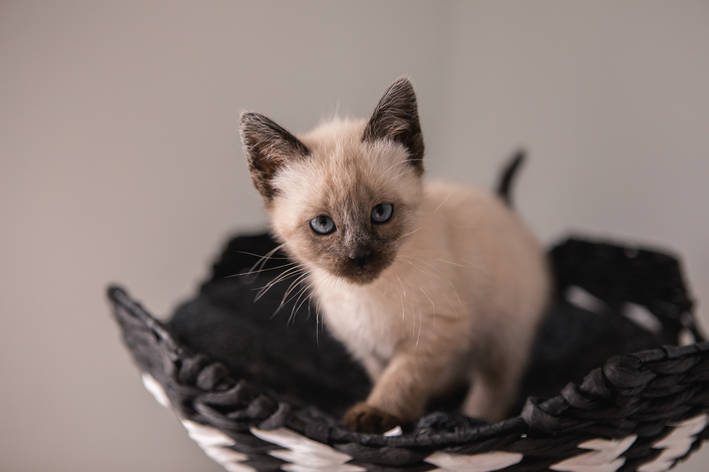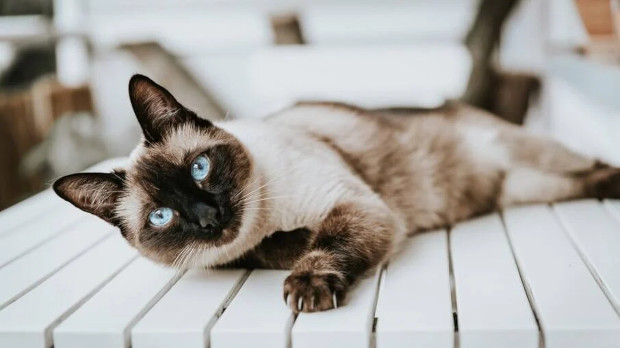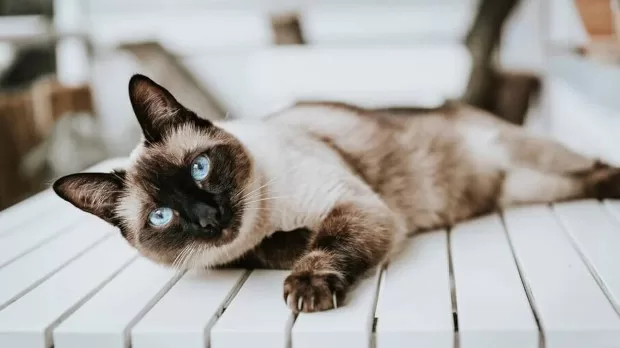The Siamese cat is one of the most elegant and distinguished breeds in the feline world. With its striking coat, expressive eyes and captivating personality, this feline wins admirers around the world. In this first part of our article, we’ll explore the physical and behavioral traits that make the Siamese unique, as well as its fascinating history.
Introduction
Siamese cats have a rich and intriguing history, originating in the lands of ancient Siam, now Thailand, where they were considered sacred animals and raised in temples. They gained popularity in the West at the end of the 19th century and have since become a symbol of elegance and sophistication. On this journey through the world of the Siamese, we will discover their outstanding characteristics, charming personality and essential care to provide a full life to these special felines.
The Physical Appearance of the Siamese Cat
Siamese cats are known for their distinctive and graceful appearance. They have a lean, muscular body with long, slender limbs. Its neck is slender, and its head is triangular in shape, with a thin muzzle and large, evenly positioned ears.
One of the most striking characteristics of the Siamese is its expressive, almond-shaped eyes, usually in an intense blue color. The Siamese’s penetrating and intelligent gaze is capable of captivating anyone, conveying a wide range of emotions.
Coat Colors and Patterns
The Siamese coat is short, fine and shiny, which facilitates grooming. The typical pattern of coloration is known as “points”, where the ends of the body, such as the ears, muzzle, paws and tail, have a darker color in contrast to the rest of the body, which is lighter. There are several colors of “points”, including seal, chocolate, blue, lilac, among others.

Personality and Temperament
In addition to its stunning appearance, the Siamese is known for its outgoing and interactive personality. These cats are highly sociable, affectionate and tend to develop strong bonds with their owners. They love to participate in family life and are often described as “cat-dogs”, as they follow their tutors around the house, play fetch and can even learn a few simple tricks.
Siamese are born vocalizers and have a characteristic melodious meow. They use their voice to communicate with their owners, expressing their needs, emotions and desires.
Origin and History of the Siamese Cat
The history of the Siamese cat dates back to ancient times in Thailand, where they were revered as sacred cats in Buddhist temples. Its origin dates back to ancient legends and stories, being associated with Thai royalty and nobility.
Discover the Elegance of the Siamese Cat: Characteristics and Care
In the second part of this article, we will continue to explore essential care to ensure the health and well-being of the Siamese cat. In addition, we’ll cover important aspects of living with this very special breed, including its relationship with other pets and some fascinating facts.

Essential Care
Siamese cats are active and intelligent pets, and providing proper care is essential to ensure their happiness and longevity. Below, we highlight some important aspects of Siamese care:
Adequate Food
A balanced diet is essential for the health of the Siamese cat. Opt for high quality food, specific for adult cats and suitable for their physical condition and age. Consult the veterinarian for guidance on the amount and frequency of meals.
Hygiene and Grooming
The Siamese’s short coat makes grooming easy, but it’s still important to brush it regularly to remove loose hair and prevent hairballs from forming. Also, keep their ears and eyes clean and check their nails regularly to prevent them from overgrowing.
Physical Activity and Games
The Siamese is an active and playful cat that needs both physical and mental stimulation. Provide interactive toys, scratchers and fun times with your tutor. Taking time to play with your Siamese is a great way to strengthen your bond.
Visit to the Veterinarian and Vaccinations
Regular visits to the vet are essential for your Siamese cat’s health. Perform routine exams, vaccinate him according to the recommended schedule and follow the health professional’s guidance on preventive measures against parasites and common diseases.
Prevention and Treatment of Common Illnesses
Like all breeds, Siamese can also be susceptible to certain health conditions. Some of the most common illnesses include breathing problems, kidney problems and obesity. Keep an eye out for any changes in your cat’s behavior and consult a veterinarian if you notice anything unusual.
Training and Socialization
Siamese are intelligent and can learn basic tricks and commands. Positive training is a great way to stimulate your cat’s mind and improve your communication. Also, socialize him from a young age, introducing him to different people, animals and environments so that he becomes a sociable and calm feline in different situations.
Environment and Space
Siamese cats adapt well to domestic environments, but it is important to provide them with enough space to move around and explore. They are very active and curious, so it’s interesting to offer different areas with toys and scratching posts so they can entertain themselves.
Living with Other Pets
The Siamese is known for its sociability and generally gets along well with other pets, especially if they are introduced correctly and early on. However, like all cats, they also have their own temperament, so it is important to monitor their interactions and ensure a safe and harmonious environment for all pets in the house.
The Importance of Mental Enrichment
Mental enrichment is critical to a cat’s well-being, and the Siamese is no exception. They need mental stimulation to avoid boredom and unwanted behaviors. Interactive toys, scratching posts with hiding places, and even treat-finding games can help keep your Siamese’s mind active and healthy.

Health and wellness
To ensure the health and well-being of your Siamese cat, it is important to pay attention to some specific aspects:
Main Health Problems in the Breed
Although Siamese are generally healthy, some illnesses are more common in this breed. Breathing problems, such as feline asthma, can occur due to their peculiar facial structure. Kidney issues are also a concern, so it’s important to monitor your cat’s kidney health and get regular checkups.
Warning Signs and Specific Care
Look out for signs of discomfort or changes in your Siamese’s behavior, such as loss of appetite, changes in urine, persistent vomiting or diarrhea. If you notice any unusual symptoms, immediately consult a veterinarian for proper evaluation and treatment.
Reproduction and Procreation
If you are interested in breeding Siamese cats, it is essential to seek guidance from responsible and experienced breeders. Reproduction requires special care, and it is essential to ensure the health of the pregnant cat and the kittens throughout the process.
Myths and Curiosities
The Siamese have been the subject of various legends and myths over the centuries. Some cultures believed that these cats were spiritual guardians or even the reincarnation of their ancestors. In addition, there are several curiosities about the breed, such as the ability to change the color of the coat over time.
Conclusion
The Siamese cat is truly one of the most charming and elegant breeds in the feline world. Its distinctive features, affectionate personality and endearing intelligence make it an exceptional pet companion. By understanding their specific needs and providing the right care, you will ensure a happy and healthy life for your beloved Siamese.
External references:
https://www.thesprucepets.com/siamese-cat-breed-profile-551912

